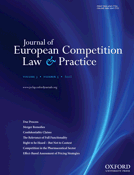
Journal of European Competition Law & Practice
Scope & Guideline
Navigating the Complexities of European Competition Law
Introduction
Aims and Scopes
- EU Competition Law and Policy Analysis:
The journal provides in-depth analyses of EU competition law, including articles that explore the application of Articles 101 and 102 TFEU, state aid rules, and merger control, emphasizing their implications for market dynamics and consumer welfare. - Impact of Digital Markets Regulation:
A significant focus is placed on the regulation of digital markets, particularly through the lens of the Digital Markets Act (DMA) and its implications for competition law, antitrust enforcement, and innovation in the digital economy. - Intersection of Competition Law and Sustainability:
The journal increasingly addresses the relationship between competition law and sustainability, exploring how competition policy can adapt to support environmental objectives and the challenges posed by sustainability agreements. - Comparative Analysis of Competition Regimes:
It features comparative studies of competition law across jurisdictions, analyzing how different legal frameworks interact and influence market practices, particularly in the context of global competition and trade. - Emerging Issues in Antitrust Enforcement:
The journal covers emerging challenges in antitrust enforcement, such as algorithmic pricing, machine collusion, and labor market collusion, reflecting the evolving nature of competition in contemporary economies.
Trending and Emerging
- Digital Market Regulation and Antitrust:
A growing body of work emphasizes the regulation of digital markets, with particular attention to the Digital Markets Act (DMA), exploring its implications for traditional antitrust frameworks and the challenges posed by tech giants. - Sustainability and Competition:
There is an increasing emphasis on the interplay between competition law and sustainability, with articles examining how competition policy can facilitate environmental goals and the legal challenges associated with sustainability agreements. - Innovative Antitrust Remedies:
Recent publications have begun to explore innovative approaches to antitrust remedies, particularly in the context of digital markets and complex mergers, reflecting a shift towards more creative and effective enforcement mechanisms. - Labor Market Competition:
A notable trend is the focus on labor market competition, including discussions about collusion in labor markets and the implications of competition law for employment practices, which have gained visibility in light of recent economic conditions. - Behavioral Insights in Competition Law:
There is an emerging interest in applying behavioral insights to competition law, particularly in understanding consumer behavior and the effects of market practices, which could lead to more informed regulatory decisions.
Declining or Waning
- Traditional Cartel Enforcement:
While still relevant, traditional discussions around cartel enforcement have seen a decrease as the journal shifts towards more innovative and complex antitrust issues, particularly in digital markets and sustainability. - Sector-Specific Competition Law:
There is a diminishing focus on sector-specific analyses, such as telecommunications and pharmaceuticals, as the journal broadens its scope to encompass cross-sectoral issues and overarching competition principles. - Historical Analyses of Competition Law:
Papers focusing exclusively on historical perspectives of competition law are less frequent, suggesting a shift towards contemporary applications and future challenges rather than retrospective evaluations.
Similar Journals

China-EU Law Journal
Contributing to the Evolution of International Legal ThoughtChina-EU Law Journal, published by SPRINGER HEIDELBERG, serves as a pivotal platform for discourse in the field of international law, particularly focusing on the legal dynamics between China and the European Union. With its ISSN 1868-5153 and E-ISSN 1868-5161, the journal caters to a growing audience interested in understanding the complexities of legal relations, policy frameworks, and regulatory challenges that arise within this crucial geopolitical arena. Although currently not labeled as open access, the journal strives to provide rigorous peer-reviewed articles that contribute significant insights into the evolving legal landscape, making it an essential resource for researchers, practitioners, and students alike. By fostering scholarly dialogue, the China-EU Law Journal aims to enhance the academic community's understanding of cross-cultural legal perspectives, further cementing its role in shaping modern legal thought.
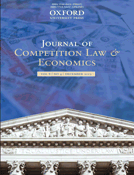
Journal of Competition Law & Economics
Illuminating the Synergy Between Legal Frameworks and Economic PrinciplesThe Journal of Competition Law & Economics, published by Oxford University Press, stands at the forefront of interdisciplinary scholarship, providing a vital platform for the analysis of competition law and economic theory. With its ISSN 1744-6414 and E-ISSN 1744-6422, this UK-based journal has gained significant recognition within the academic community, achieving a Q1 ranking in Law and a Q2 ranking in Economics and Econometrics as of 2023. This distinction highlights the journal's commitment to high-quality research, as evidenced by its Scopus rankings—placing it in the top 22% of Law journals and the top 56% of Economics journals. Covering a range of topics from antitrust regulation to economic impacts on market structures, the journal aims to bridge the gap between legal frameworks and economic principles, fostering a deeper understanding of their interplay. Scholars, practitioners, and students alike will find invaluable insights within its pages, enhancing their engagement with ongoing debates in these critical fields.

Theoretical Economics
Transforming Ideas into Economic InsightsTheoretical Economics, published by the Econometric Society, is a premier open-access journal dedicated to advancing the field of economics through rigorous theoretical analysis. With an ISSN of 1933-6837 and an E-ISSN of 1555-7561, this journal has been at the forefront of economic scholarship since its inception. Operating out of New York University, it holds a prestigious Q1 ranking in the category of Economics, Econometrics, and Finance, reflecting its influential contributions to the discipline. By making research freely accessible since 2006, Theoretical Economics not only fosters a broader dissemination of knowledge but also promotes collaborative dialogue among economists worldwide. The journal's convergence years span from 2007 to 2024, ensuring ongoing relevance in a rapidly evolving field. Researchers, professionals, and students alike will find Theoretical Economics an essential resource for staying informed about cutting-edge theoretical advancements in economics.
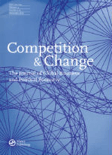
Competition & Change
Unveiling the Forces Behind Competition and ChangeCompetition & Change is a premier journal published by SAGE Publications Ltd, dedicated to the field of business, management, and accounting. With an impressive 2023 Q1 ranking and a notable Scopus rank of #39 out of 218 in its category, it stands out as an influential platform for contemporary research, thus reflecting an esteemed 82nd percentile in terms of impact. The journal spans a broad array of topics surrounding the dynamics of competition and change within various business environments, making it essential reading for professionals, academics, and students alike. Designed to foster dialogue and innovation, the journal publishes high-quality original research articles, reviews, and case studies that examine critical challenges and trends in business today. With its commitment to pioneering insights and interdisciplinary approaches, Competition & Change is poised to shape the future of management scholarship and practice.
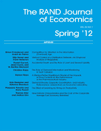
RAND JOURNAL OF ECONOMICS
Your Gateway to Cutting-Edge Economic ResearchRAND JOURNAL OF ECONOMICS, published by Wiley, is a prestigious peer-reviewed journal that has been a cornerstone in the field of economics since its inception in 1984. With a focus on empirical and theoretical research, it aims to bridge the gap between economic theory and real-world application, providing insights that are both rigorous and relevant. The journal holds an impressive Q1 ranking in Economics and Econometrics, reflecting its significant impact and influence in the field, evidenced by its Scopus rank of #199 out of 716 in related categories. Although it does not offer open access, the journal remains accessible to a broad audience through institutional subscriptions. Researchers, professionals, and students will find RAND JOURNAL OF ECONOMICS an invaluable resource for cutting-edge economic analyses and a vital platform for scholarly dialogue about contemporary economic issues.

European Public Law
Advancing the discourse of public law across Europe.European Public Law is an esteemed journal dedicated to advancing scholarly discourse in the realm of public law across Europe. Published by KLUWER LAW INTERNATIONAL, this journal serves as a pivotal platform for researchers, practitioners, and students who seek to explore the complexities of legal frameworks and their implications on governance in the European context. With an ISSN of 1354-3725 and an E-ISSN of 1875-8207, it ranks in the Q3 category of law journals according to the 2023 assessment, indicating its growing influence within the legal academic community, as reflected by its Scopus rank of #399 out of 1025. Although European Public Law is not currently an open-access journal, its comprehensive publication scope from 2018 to 2024 showcases a commitment to addressing contemporary legal challenges and fostering a deeper understanding of public law's evolution. Whether you are a seasoned professional or an emerging scholar, this journal is an invaluable resource for in-depth analyses, discussions, and innovations in the field of law.

WASHINGTON LAW REVIEW
Your Gateway to Pioneering Legal InsightsWASHINGTON LAW REVIEW, published by the University of Washington School of Law, is a premier legal journal that plays an essential role in the dissemination of scholarly work in the field of law. With a longstanding commitment to excellence, this journal has been pivotal in shaping legal discourse since its inception. It is ranked in the Q2 quartile in Law, as per 2023 evaluations, and holds a notable position within the top 54th percentile of its category on Scopus. The journal’s extensive publication history, covering years from 1973 to 2024, provides a rich repository of legal scholarship, making it a valuable resource for researchers, practitioners, and students alike. While the journal does not currently offer open access, its authoritative articles cover a diverse array of topics within legal studies, ensuring that the most relevant and impactful discussions are accessible to the academic community and beyond. For those looking to stay informed about cutting-edge legal issues and advancements, WASHINGTON LAW REVIEW remains an indispensable asset in the pursuit of knowledge and advocacy in the realm of law.

European Review of Private Law
Fostering Insightful Discussions on Private LawEuropean Review of Private Law, published by KLUWER LAW INTERNATIONAL, is a distinguished academic journal that provides a comprehensive platform for scholarly research in the field of private law. With an ISSN of 0928-9801 and an E-ISSN of 1875-8371, this periodical features insightful articles, case studies, and reviews that contribute to the ongoing dialogue among legal scholars and practitioners. Although classified in the 2023 Q4 quartile within the law category, this journal fosters important discussions on pertinent aspects of private law, driving forward legal scholarship particularly in a European context. The journal operates under a traditional subscription model, ensuring a rigorous peer-review process for all submitted work. Its address is ZUIDPOOLSINGEL 2, PO BOX 316, 2400 AH ALPHEN AAN DEN RIJN, NETHERLANDS. The role of the European Review of Private Law is vital, serving as a conduit for fresh perspectives and developments that impact both legal theory and practice. Whether you are a researcher, a legal practitioner, or a student, this journal offers invaluable insights that resonate deeply within the legal community.
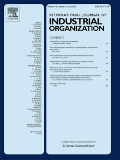
INTERNATIONAL JOURNAL OF INDUSTRIAL ORGANIZATION
Illuminating pathways in manufacturing and organizational effectiveness.INTERNATIONAL JOURNAL OF INDUSTRIAL ORGANIZATION, published by ELSEVIER, stands as a significant contributor to the fields of industrial organization, economics, and related disciplines. Since its inception in 1983, this peer-reviewed journal has focused on the interplay between organizational structures and market dynamics, delivering critical insights that propel academic and professional discussions. With an impressive scope covering topics from industrial relations to manufacturing engineering, it has carved out a niche as a vital resource for researchers, academics, and practitioners. The journal enjoys a strong reputation, evidenced by its Q1 ranking across multiple categories in 2023, including Aerospace Engineering, Economics, and Strategy and Management, confirming its relevance and impact within the academic community. Furthermore, the journal's rankings on Scopus highlight its influence, particularly in the realms of Industrial Relations and Economics. While primarily subscription-based, the wealth of information and the rigor of the published studies make it indispensable for those keen on advancing knowledge in industrial organization and its multifaceted applications.

Journal of Industry Competition & Trade
Navigating the complexities of industry and trade.The Journal of Industry Competition & Trade, published by SPRINGER, stands as a premier platform for scholars and professionals engaged in the interdisciplinary study of economics, industrial relations, and trade dynamics. With a notable impact factor and classified in the Q2 quartile for both Economics and Econometrics and Industrial Relations, this journal plays a crucial role in disseminating high-quality research from 2004 to 2024. Targeting issues central to industry competition, trade policies, and market structures, this journal aims to enhance understanding and foster academic discourse in these critical areas. Its ranking within Scopus reinforces its influence, positioned at 303 out of 716 in Economics and Econometrics, reflecting a strong 57th percentile ranking. Although currently not operating under an open-access model, the journal ensures that essential research findings are accessible to a wide array of readers, including researchers, economists, policymakers, and students, thereby contributing significantly to the advancement of knowledge in industry competition and trade.